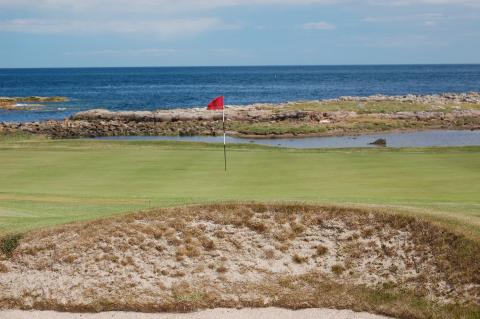That caveat aside, the Zillow maps provide a colorful glimpse of price trends by major market
Based on the Zillow maps, here are few data points and observations from markets around the country:
- Augusta, GA is up 2% and more, yet just across the river in Aiken, SC, the market is down 7% to 9%. Aiken built more large communities in the late ‘90s and early ‘00s than did Augusta.
- Austin, TX, is going gangbusters, according to Zillow, strongly orange with just a touch of yellow here and there. The University of Texas, state government offices and big companies, like Dell Computer, are providing a stable base of employment. Austin never shows up on lists of cities with foreclosure problems.
- Prices in the Charleston, SC, area are off significantly, with black diamonds on Kiawah and Edisto Islands indicating drops of 20% or more in those upscale environs. Over 20 years, prices on Kiawah have defied any gravitational pull. A correction was inevitable.
- The greater Charlotte area, hit hard by the problems by local companies Bank of America and Wachovia, has gone green (- 3% to -4%) and worse.
- Greenville, SC, is holding its own, up a couple of points, but most communities within a half hour radius are suffering. One exception is Travelers Rest, SC, site of The Cliffs Valley community, which is showing some bright orange.
- Prices in Spartanburg, about a half hour from Greenville and home to America's largest BMW plant, are off about 3%. Once the car industry sorts itself out, look for a more stable local market.
- Jacksonville, FL, and the ocean communities nearby are a dark shade of blue, with prices off 13% and higher. Fewer guests at resorts like Amelia Island mean fewer tours of available homes and way fewer spur-of-the-moment decisions to purchase vacation homes.
- Knoxville, TN, is not doing badly, off 3% or so, with some suburbs up a little. Local community real estate is among the most reasonably priced in the south, and Tennessee has no state income tax.
- Naples, FL, is looking very dark, north and the south of the city. Naples was one of the first to see dramatic price losses, and it could be one of those to lead an overall rebound -- whenever.
- The best colors you see in Orlando, Sarasota, and Tampa are a deeper shade of blue.
- Raleigh, NC, is down 5% to 6% with its nearby suburbs in no better shape. Winston-Salem is down a like amount. Raleigh, with its solid service economy base (Research Triangle Park) has been a stalwart of stability. Its losses signal that the optimistic predictions by many real estate observers about a rebound nationwide are likely to be too rosy.
- Finally, the cities hardest hit in the market collapse, like Phoenix, Miami and Las Vegas, are still showing almost solid black. Only one tiny diamond of orange shows through along the Palm Coast of Florida, in Palm Beach. Such a surprising piece of data implies that Zillow's data is corrupted or that the mainstream media's reports are corrupted: Maybe all those Bernie Madoff clients weren't forced to sell their homes after all.

























